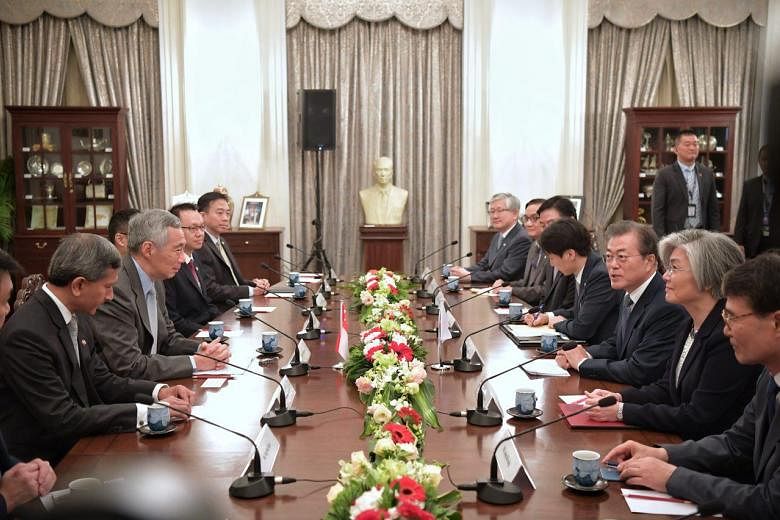SINGAPORE - By hosting the historic summit between the United States and North Korea last month, the people of Singapore have contributed immensely towards ushering in a new era of peace on the Korean Peninsula, said South Korean President Moon Jae-in on Thursday (July 12).
"On behalf of all Korean people, I would like to once again express my profound gratitude to the people of Singapore," said Mr Moon, who is in Singapore for a three-day state visit ending on Friday.
Speaking at a joint press conference with Prime Minister Lee Hsien Loong following their meeting, Mr Moon said they agreed to closely cooperate for peace and stability in the region.
Mr Lee said Singapore believes constructive dialogue is necessary to peace in the region, and is happy to have played a role by hosting the US-North Korea summit on June 12.
"We wish South Korea and all other parties involved in the process success. It is a long road ahead, with many more challenges to overcome. I hope the Singapore meeting has set things moving in the right direction," said Mr Lee.
Both leaders spoke warmly of South Korea's ties with Singapore and Asean, as well as areas for further cooperation, after their meeting which Mr Lee called a "good discussion on expanding bilateral and regional cooperation".
Mr Moon also extended an invitation to Mr Lee to visit South Korea, which Mr Lee said he was happy to accept.
On Thursday morning, the South Korean leader received a ceremonial welcome at the Istana before he called on President Halimah Yacob.
Expanding Singapore-Korea cooperation
Both sides agreed to further deepen economic cooperation, Mr Moon told reporters.
Among Asean countries, Singapore is South Korea's second-largest trade partner and largest investment partner, he said.
Mr Moon said that he and Mr Lee agreed to invigorate mutual investment by significantly increasing their bilateral trade volume, which currently stands at US$20 billion (S$27 billion), and to swiftly conduct a revision of the double tax avoidance agreement.
The leaders also discussed strengthening air connectivity. Mr Lee hoped that both sides could expand their air services agreement and increase the number of flights to include other major South Korean cities like Busan.
The leaders also witnessed the exchange of six agreements to cooperate more deeply in the areas of trade, industry, energy, environmental cooperation, start-ups and small and medium-sized enterprises, and investment.
Said Mr Lee: "The Republic of Korea is strong in technology and innovation, while Singapore is well-connected to the region."
Singapore companies are showing growing interest in South Korean sectors such as real estate, manufacturing, electronics, precision engineering, transport, food, and information and communications technology, he added.
Under the agreement on trade, both countries will launch a review of the implementation of the Korea-Singapore Free Trade Agreement (FTA) within six months.
They will look to further liberalise tariffs for certain products as part of strengthening the FTA, the Ministry of Trade and Industry said in a statement.
Singapore and South Korea also reaffirmed their commitment towards the Regional Comprehensive Economic Partnership (RCEP), an Asean-led trade pact which also involves six of the regional grouping's trading partners: Australia, China, India, Japan, South Korea, and New Zealand.
Said Mr Lee: "We look forward to substantially concluding the negotiations by the end of this year."
Singapore and South Korea also vowed to cooperate in technologies including medical technology, artificial intelligence and the industrial Internet of things.
For instance, they may hold joint seminars, conferences and business conferences.
They also agreed to cooperate further in the area of smart grids - electrical grids that use technology to detect energy usage remotely - including energy storage systems and energy security.
Mr Moon said that they agreed to joint ventures in smart city projects overseas.
"Singapore companies have strong points in software, project management, while Korean companies have strong points in hardware like IT. If we combine, we can achieve great cooperation in the smart city area not just in Asia but the whole world."


